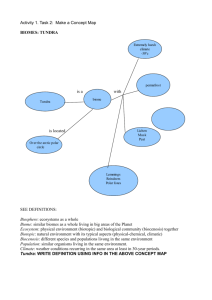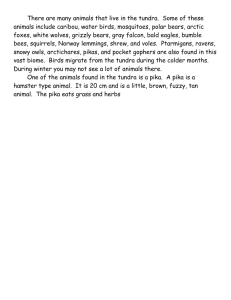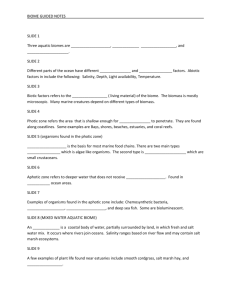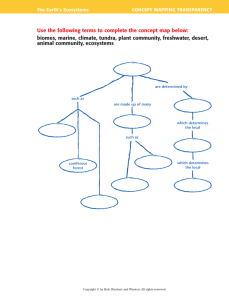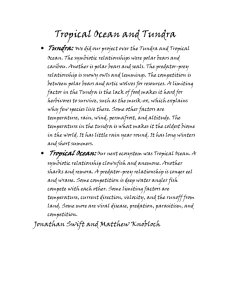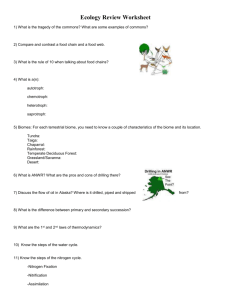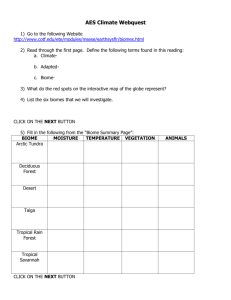The Scope of Ecology
advertisement
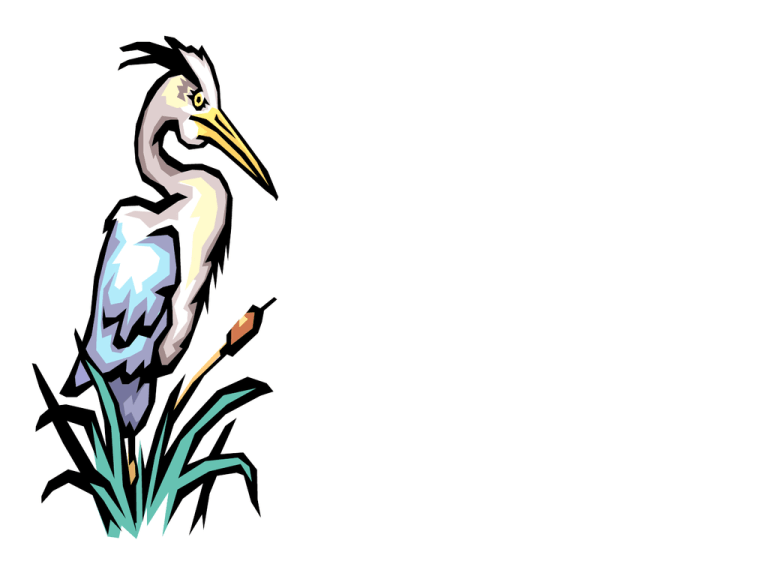
The Scope of Ecology Chapter 34 What is ecology? Ecology- the scientific study of interactions between organisms and their environments, focusing on energy transfer • It is a science of relationships. Oikos- greek for “house” Ecology is primarily a descriptive science but is becoming more experimental 1. very difficult to control experiments 2. some research done in laboratories 3. most done in the field What do you mean by environment? The environment is made up of two factors: Biotic factors- all living organisms inhabiting the Earth Abiotic factors- nonliving parts of the environment (i.e. temperature, soil, light, moisture, air currents) Interaction • interaction includes how the environment affects the organism and how the organism can alter the environment Interaction photosynthetic organisms use sunlight (abiotic factor) and produce oxygen as a bi-product which is used by organisms for cellular respiration • 1. Interaction • 2. shading of the forest floor by trees can make the environment less suitable for their offspring to grow, yet more suitable for other organisms Levels of Ecology • ecological research ranges from studying adaptations of organisms to the dynamics of ecosystems • Organism- any unicellular or multicellular form exhibiting all of the characteristics of life, an individual. • The lowest level of organization • 1. organismal ecology – study of the way organisms meet the challenges of abiotic environmental factors • e.g., reptiles retreat to shaded areas to maintain body temperature • Population-a group of organisms of one species living in the same place at the same time that interbreed and compete with each other for resources (ex. food, mates, shelter) 2. population ecology – study of populations and interaction with environment e.g., what environmental factors affect population size and composition? • Community- several interacting populations that inhabit a common environment and are interdependent. • 3. community ecology – study of all organisms that inhabit an area • e.g., study of predator – prey relationships, competition, disease • 4. ecosystem ecology – study of all abiotic factors as well as all organisms in an area • e.g., study of energy flow and chemical cycling among the biotic and abiotic components • Biosphere- life supporting portions of Earth composed of air, land, fresh water, and salt water. • The highest level of organization • 5. Biosphere ecology – studying the global system of living things • e.g. humans effect on the ozone layer or climate change Biosphere Ecosystem Community Population Organism Abiotic factors • temperature 1. most organisms are NOT able to regulate their body temperature; i.e., they’re ectothermic as apposed to endothermic 2. temperature has a tremendous affect on metabolism 3. even endotherms function best within a temperature range Abiotic factors • water 1. essential for life 2. poses osmotic challenges for organisms Abiotic factors • wind amplifies the effects of temperature by increasing heat loss and evaporation Abiotic factors Climate Weather over a long period of time most important components – Precipitation – Temperature – Wind Convection Heat transfer in a fluid (liquid or gas) Heat rises The current formed is a Convection Cell Desert Latitude 30 degrees N or S Cool dry falling air limits precipitation Rain-Shadow Effect Rain Shadow Effect Air flowing over mountain ranges rises and cools, losing moisture Climate is much dryer on the backside of the mountain range Coriolis Effect Coriolis effect is the apparent curvature of global winds, ocean currents, and everything else that moves freely across the Earth's surface. Northern Hemisphere- everything turns right causing counterclockwise rotation of weather systems Polar Easterlies Westerlies Northeast Tradewinds Seasons Seasons are caused by the Earth’s tilt on its axis Terrestrial Biomes Terrestrial Biomes Biome- geographic areas that have similar climates and ecosystems Terrestrial Biomes The most common biomes are: • • • • • • • Tundra Taiga Temperate Deciduous Forest Tropical Rain Forest Grassland Savanna Desert Terrestrial biomes Tundra is located in areas where temperatures minimize plant growth but not covered completely with ice Tundra Found in parts of Canada, Alaska, and Siberia Tundra – “The Cold Desert” • Found at latitudes around the North Pole • Less than 25 cm precipitation yearly • Very cold year round (-40ºC in winter) • Cold, dry, treeless region Tundra – “The Land of the Midnight Sun” • Winter lasts 6 to 9 months with no daylight • Summer is short and cold with 24 hours of sunlight a day Tundra- • Soil is poor • Permafrost –Layer of permanently frozen soil Plants of the Tundra Tundra plants are resistant to drought and cold Plants of the Tundra • Reindeer moss – It’s a lichen! Plants of the Tundra • Lichens Plants of the Tundra • Lichen Plants of the Tundra • True Mosses Plants of the Tundra • Small shrubs and flowers Plants of the Tundra • Small shrubs and flowers Plants of the Tundra • Small shrubs and flowers Plants of the Tundra • Grasses Animals of the Tundra Many animals of the tundra migrate there during the short summer Animals of the Tundra • Biting insects Mosquito Blackfly Animals of the Tundra • Snowy owl Animals of the Tundra • Arctic hare Animals of the Tundra • Caribou – “Reindeer” Animals of the Tundra • Musk oxen Animals of the Tundra • Lemmings Animals of the Tundra • Lemmings
